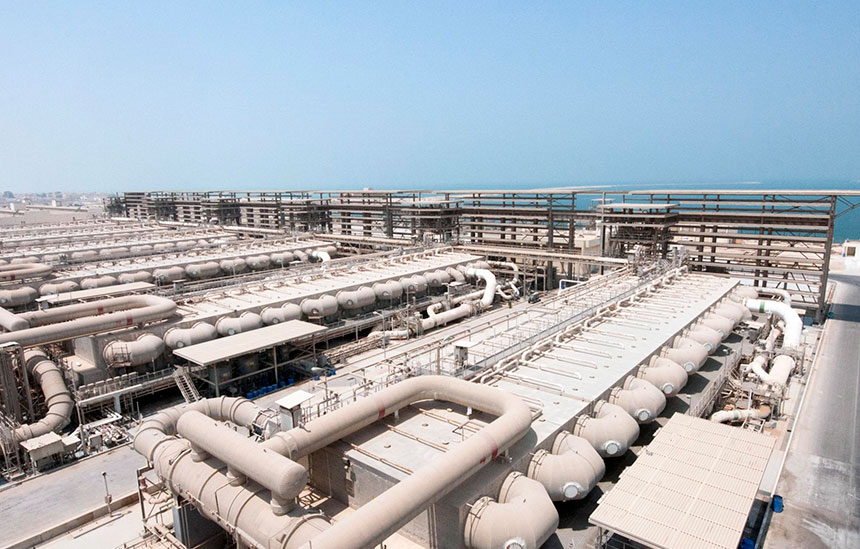Saline Water Conversion Corporation (SWCC) unveiled the initiative to develop an ambitious strategy for an across-the-board improvement of its production systems of desalinated seawater. Taken together, SWCC seeks to further increase production capacity, while maintaining the highest quality standards put in place and observing the safety of the environment. Inspired by the Custodian of the Two Holy Mosques, may Allah safeguard him, to best implement several key initiatives, which resonate with the unlimited support evinced by His Royal Highness Crown Prince, may Allah protect him, to put into action the liquid fuel displacement initiatives, enhance eco-friendly processes, reduce carbon emissions across the Kingdom and better contribute to achieving the goals of the Kingdom’s Vision 2030.
ENVIRONMENTAL COMPLIANCE
Remarkably enough, SWCC has attached such a great attention to and care for, par excellence, environmental compliance across all the relevant activities and operations carried out by SWCC ever since inception to date. Observing the continued commitment to this added value, SWCC created an initiative in 2018 to replace the Khafji field production system operating with liquid fuel technology with a new system supported by reverse osmosis technology and characterized by low-cost material and limited energy consumption. In 2019, SWCC successfully removed from service Jeddah (phase 4) and Yanbu (phase 1) production systems that operate on liquid fuel, while maintaining their contractual obligations by using high-efficiency operational maneuvers for desalinated water transportation systems and providing alternative quantities from other production systems with higher efficiency. Equally important in 2020, despite the COVID-19 pandemic, SWCC successfully replaced desalination technologies in small production systems along the Red Sea coast in a timely manner as scheduled, which helped to operate without the use of diesel, achieve energy savings and enhance the eco-friendly protocols of the plants.
ENVIRONMENTALLY FRIENDLY TECHNOLOGIES
The unique step, among several others, that makes the said strategy stand out is the implementation of several initiatives to replace the main thermal technology production systems that depend on liquid fuel with production systems powered by reverse osmosis technology in the Khobar production systems (phase 2) and Jubail (phase 1) that are expected to be hopefully completed sometime into the second half of 2022, along with the projects to replace the production systems of Al-Shaqiq (phase 1) and Shuaiba (phase 1), and Jubail (phase two), which will be in service respectively in 2023. Of good note, the series of these projects will be brought to completion by the establishment project of dry gas pipeline to feed the production system and the desalination and electric power generation in Yanbu (phase 3) to be an alternative to liquid fuel oil.
Alongside the implementation of the initiatives specifically developed to reduce carbon emissions, SWCC has gone to great lengths further beyond the limit and has taken measures that would reduce gas emissions associated with fuel combustion in several production systems. To this effect, SWCC developed several research initiatives to take advantage of such gases and return production systems. With these initiatives coming into play, SWCC obtained a number of patents, especially those related to the technology of brine zero liquid discharge (ZLD), which allows converting the brine solution into a by-product of minerals that can be used in a number of industries, as well as developing technology to absorb gases and convert them into investment products, such as methanol gas. Combined together, such concerted and unremitting efforts well strengthened SWCC role in supporting the national economy and promoting environmental compliance, which in turn further qualified its production systems to obtain environmental licenses of category (3) and a certificate of environmental compliance in accordance with ISO 14001.
SWCC is currently seeking to remove the remaining production systems that use liquid fuel from service; Yanbu production system (phase 2) will be removed once Arrayis system of the private sector becomes in service in the first half of 2023, and the Rabigh production system will be removed once Rabigh system (phase three of the private sector becomes in service by the end of 2021. Equally important, SWCC also plans to replace Shuaiba production system (phase two) operated by liquid fuel with a production system powered by the technology of reverse osmosis.
LEADERSHIP AND SUSTAINABILITY
These initiatives will have resounding results in terms of environmental sustainability, as energy consumption will decrease by more than (318,000) barrels of fuel per day. Equally important, carbon dioxide emissions will be reduced by more than (40) million tons per year, which represents more than (30%) of the total reduction targeted in the Kingdom’s Vision 2030, in addition to saving billions of Saudi Arabian Riyals.
The foregoing strategy highlights the SWCC commitment to leadership in the development of the desalination industry in all relevant aspects. Remarkably enough, SWCC has evinced robust engagement in actively and proactively contributing to achieving the ambitious goals of the Kingdom of Saudi Arabia, spearheaded by Vision 2030. Taken together, the all-out efforts act as a prelude for SWCC to assume the pioneering role of the main global contributor to providing innovative solutions to future water-related risks and challenges.

